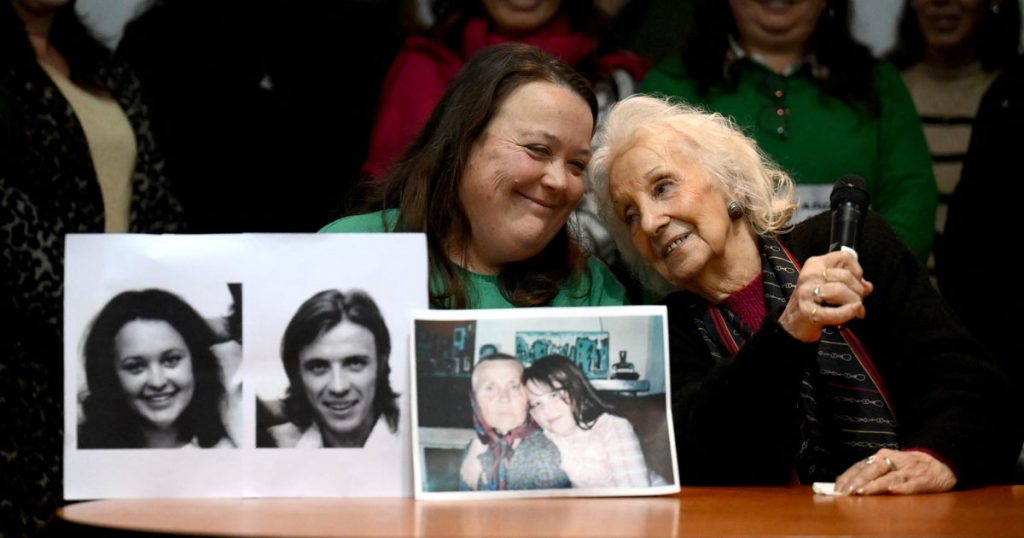In a significant development that underscores Argentina’s ongoing struggle for justice regarding the dictatorship-era disappearances, a man identified as the 140th “stolen grandchild” has been reunited with his family. Born in a clandestine detention center during Argentina’s military dictatorship, he is one of several hundred children taken from their parents, many of whom were leftist activists. The Grandmothers of Plaza de Mayo, a prominent human rights organization, confirmed his identity through DNA testing, marking another milestone in their decades-long quest to locate these missing individuals.
| Article Subheadings |
|---|
| 1) Background of Argentina’s Stolen Grandchildren |
| 2) The Role of the Grandmothers of Plaza de Mayo |
| 3) Reunion of “Grandchild No. 140” |
| 4) Continued Challenges Amid Political Changes |
| 5) Future Implications and the Search for Identity |
Background of Argentina’s Stolen Grandchildren
During Argentina’s so-called “dirty war” from 1976 to 1983, a military dictatorship systematically targeted left-wing activists and their families. Thousands were “disappeared,” meaning they were detained, tortured, and often killed without a trace. Many of these activists were pregnant women who gave birth in clandestine detention centers. It is estimated that nearly 500 infants were taken from their mothers and given to families aligned with the regime, often with the intent to raise them as supporters of the government. The plight of these children, who would grow up unaware of their biological identities, has garnered international attention and compassion.
The Role of the Grandmothers of Plaza de Mayo
Established in 1977, the Grandmothers of Plaza de Mayo is a human rights organization founded by women determined to find their grandchildren and restore their family identities. They began by protesting in the Plaza de Mayo in Buenos Aires, demanding information about their disappeared children and grandchildren. The group has worked tirelessly to collect genetic data and facilitate the reunion of stolen grandchildren with their families. Their efforts have resulted in the successful identification of over 140 individuals through DNA testing, rekindling hope for many families still searching for their loved ones.
Reunion of “Grandchild No. 140”
The recent press conference held by the Grandmothers revealed the joyous confirmation of “Grandchild No. 140.” The man, whose identity has not been fully disclosed, was linked back to his biological family through a DNA test prompted by an anonymous tip. His older sister, Adriana Metz Romero, who actively collaborates with the Grandmothers, expressed her relief and excitement at finally knowing her brother’s whereabouts. “Now I know where my brother is!” said Romero, who has been through a harrowing journey herself, having grown up without her parents after they were taken during the dictatorship.
Continued Challenges Amid Political Changes
The environment for human rights organizations in Argentina has shifted significantly in recent years. Current President Javier Milei has been critiqued for minimizing the death toll attributed to the dictatorship and for defunding essential resources for organizations like the Grandmothers. In recent months, the Grandmothers have legally challenged the reduction of funds allocated to the National Genetic Data Bank, which plays a crucial role in identifying the stolen grandchildren. This budget cut has rendered their operations nearly paralyzed, raising serious concerns about the future of ongoing searches and reunions.
Future Implications and the Search for Identity
As more individuals are identified and reunited with their families, the implications extend beyond personal stories. The Grandmothers of Plaza de Mayo emphasize the need for state support in recognizing the historical injustices inflicted upon these families. Estela de Carlotto, a prominent leader of the organization, has reiterated the importance of state accountability in the abductions of these children. “The state itself, through state terrorism, facilitated the abduction of these children, so it must now facilitate the search for them,” she asserted. The ongoing quest for identity for the remaining children who still await recognition remains paramount in supporting Argentina’s social healing.
| No. | Key Points |
|---|---|
| 1 | The recent identification of “Grandchild No. 140” highlights the ongoing efforts to reunite families separated during the dictatorship. |
| 2 | The Grandmothers of Plaza de Mayo have played a critical role in advocating for the rights of victims’ families since 1977. |
| 3 | Political changes in Argentina under President Javier Milei include defunding crucial human rights initiatives. |
| 4 | Many individuals are still searching for their identities, with ongoing efforts needed to support their reunifications. |
| 5 | Estela de Carlotto emphasizes the state’s responsibility acknowledging historical injustices against these families. |
Summary
The identification of “Grandchild No. 140” is not just another success in the long fight of the Grandmothers of Plaza de Mayo but also a poignant reminder of the many lives disrupted by Argentina’s dark history. The challenges that lie ahead, particularly in securing governmental support for ongoing efforts to reunite families, remain formidable. However, the persistent work of activists like the Grandmothers shines a light on the enduring hope for justice and healing in Argentina.
Frequently Asked Questions
Question: How many stolen grandchildren have been identified in Argentina?
As of now, over 140 stolen grandchildren have been identified through the efforts of the Grandmothers of Plaza de Mayo, marking significant progress in their decades-long mission.
Question: What was the role of the military dictatorship in these abductions?
The military dictatorship, during its regime from 1976-1983, systematically targeted leftist activists and their families, resulting in the abduction of children born to detained mothers to erase memories of opposition and instill loyalty to the regime.
Question: Why is the National Genetic Data Bank essential for the Grandmothers’ mission?
The National Genetic Data Bank is crucial for matching DNA samples of individuals claiming identity with the family members of those who were abducted, facilitating reunions and identification.


